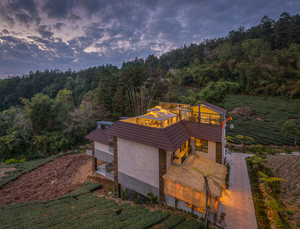Alishan Accommodation & Food
 Alishan has a range of tourist hotels, but many visitors prefer homestays located in quiet mountain communities outside the forest recreation area. In the best of these, guests can appreciate the region’s sublime scenery without even having to leave their rooms.
Alishan has a range of tourist hotels, but many visitors prefer homestays located in quiet mountain communities outside the forest recreation area. In the best of these, guests can appreciate the region’s sublime scenery without even having to leave their rooms.
The Alishan area doesn’t have the international dining options of Taiwan’s big cities. Rather, local cuisine reflects the honest, hard-working and down-to-earth character of Alishan’s people. After a day of sightseeing and hiking, nothing goes down better than super-fresh greens cultivated in the region’s pristine environment, served with local specialities like succulent chicken fried in tea oil. Of course, some of your most delightful food memories may be utterly unplanned. If during your private tour of the uplands you spot a roadside vendor barbequing mouthwatering sausages, don’t be shy to ask your driver-guide to stop so you can try a couple.
The Tsou indigenous ethnic group has its own way of cooking. Like several other Austronesian tribes in Taiwan’s interior, traditionally they lived by snaring and trapping wild animals, and gathering wild vegetables quite unlike those grown in the lowlands. Hunting and foraging habits still influence what the Tsou eat and what they serve in their eateries. Roasted mountain boar, flash-fried freshwater shrimp and unique salads make for a deliciously memorable feast!
Tea doesn’t merely give many of Alishan’s hillsides — especially those around Shizhuo, approximately 1,300 m (4,265 ft) above sea level — their distinctive appearances. It’s also the area’s most famous and lucrative crop, with some of the world’s finest and most expensive oolong teas being grown here by third-generation farmers. Several keep their doors open and welcome visitors eager for an informal tasting. Excellent coffee is also grown in this part of Taiwan, albeit in small quantities.
